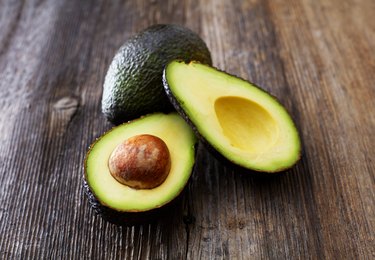
Avocados are more than a passing nutrition fad — the creamy fruit is both delicious and good for your heart, thanks to its monounsaturated fat content. However, because of the number of calories in half an avocado, they should be consumed in moderation.
Calories in Half an Avocado
Video of the Day
The number of calories in half an avocado depends on the type and size of the fruit. Hass avocados, also known as California avocados, are the most popular type, according to Colorado State University. Half a 136-gram California avocado has approximately 114 calories, plus about 10.5 grams of fat and 1.3 grams of protein, according to USDA's FoodData Central. Florida avocados are typically larger than Hass avocados. Half a Florida avocado that weighs 304 grams without skin or seeds has around 182 calories, 15 grams of fat and nearly 3.5 grams of protein.
Video of the Day
While avocados are high in calories compared to other types of produce, that's no reason to avoid them — simply enjoy avocados in moderation. According to the Cleveland Clinic, eating half to one avocado each day is completely fine. It's more important to focus on eating whole foods rather than processed foods, and less important to focus on the calories in half an avocado and other nutritious foods.
Half-Avocado Nutrition
Despite the calorie count, avocados are a healthy choice because of the nutrients they contain. There's a long-standing myth that fat contributes to obesity, but a healthy diet includes a good amount of healthy fats, Cleveland Clinic notes. Avocados are a good source of monounsaturated fat, which helps reduce unhealthy cholesterol levels and decrease the risk of heart attack and stroke.
Monounsaturated fat also helps develop and maintain the cells of the body, according to the American Heart Association. Finally, the fat in avocados also helps your body to absorb the fat-soluble vitamins A, D, E and K when you pair it with foods that contain these vitamins, notes Colorado State University.
Avocados are high in fiber too, with 9.25 grams in a California avocado and 17 grams in a Florida avocado, according to USDA's FoodData Central. Fiber is a type of indigestible carbohydrate that regulates blood sugar, which helps ward off hunger. Although a person is supposed to have between 25 and 30 grams of fiber each day, the majority of Americans only eat 15 grams a day. Avocados are also an excellent source of potassium — an electrolyte that's necessary for muscle contractions and nerve function — as well as vitamin E, vitamin C and folate.
Read more: 19 High-Fiber Foods — Some May Surprise You!
Moderating Avocado Intake
Avocados are a good source of healthy nutrients. However, those who are watching their weight might want to stick to one avocado or less each day, Cleveland Clinic recommends. Additionally, avocados are considered a higher FODMAP food, which means they contain short-chain carbohydrates that are difficult for certain people to digest, the Academy of Nutrition and Dietetics reports. Because of that difficulty, some people might experience gassiness, bloating, abdominal pain or diarrhea after eating an avocado.
- USDA FoodData Central: "Avocados, Raw, California"
- USDA FoodData Central: "Avocados, Raw, Florida"
- Cleveland Clinic: "Can You Eat Too Much Avocado?"
- Colorado State University: "Avocados"
- American Heart Association: Monounsaturated Fat
- Harvard T.H. Chan School of Public Health: Fiber
- U.S. National Library of Medicine: Potassium
- Academy of Nutrition and Dietetics: What Is the Low FODMAP Diet?